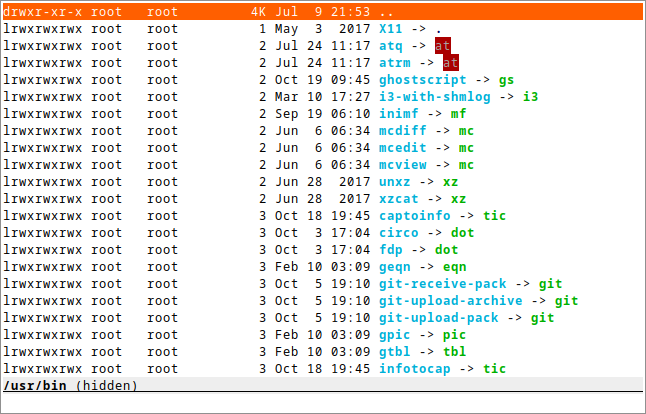Copying snippets from the README was uncomfortable and laborious, and wasted a lot of space in the document, especially after the recent additions. Closes #3
sdn
sdn is a simple directory navigator that you can invoke while editing shell commands. It enables you to:
-
take a quick peek at directory contents without running
ls -
browse the filesystem without all the mess that Midnight Commander does: there’s no need to create a subshell in a new pty. The current command line can be simply forwarded if it is to be edited. What’s more, it will always be obvious whether the navigator is running.
The only supported platform is Linux. I wanted to try a different, simpler approach here, and the end result is very friendly to tinkering.
Building
Build dependencies: CMake and/or make, a C++14 compiler, pkg-config
Runtime dependencies: ncursesw, libacl
Unfortunately most LLVM libc++ versions have a bug that crashes sdn on start. Use GNU libstdc++ if you’re affected.
$ git clone https://git.janouch.name/p/sdn.git $ mkdir sdn/build $ cd sdn/build $ cmake .. -DCMAKE_INSTALL_PREFIX=/usr -DCMAKE_BUILD_TYPE=Debug $ make
To install the application, you can do either the usual:
# make install
Or you can try telling CMake to make a package for you. For Debian it is:
$ cpack -G DEB # dpkg -i sdn-*.deb
There is also a Makefile you can use to quickly build a binary to be copied into the PATH of any machine you want to have sdn on.
Integration
The package contains an installation script called sdn-install which will bind sdn to M-o in your shell’s initialisation file. The supported shells are:
-
zsh: works well
-
bash: minor issue: exiting the navigator confirms an empty prompt
-
fish: works well
-
elvish: version 0.14.1 and above, an unstable API is used, works well
elvish is absolutely perverse. And so is integrating sdn into it because it already includes a custom file manager, bound to Ctrl-N (though I find the ranger-like interface confusing and resource-demanding).
Configuration
Colours
Here is an example of a ~/.config/sdn/look file; the format is similar to that of git, only named colours aren’t supported:
cursor 231 202 bar 16 255 ul cwd bold input cmdline 145
Filename colours are taken from the LS_COLORS environment variable.
Run dircolors to get some defaults.
Bindings
To obtain more vifm-like controls, you may write the following to your ~/.config/sdn/bindings file:
normal h parent normal l choose normal ? help
Helper programs
The F3 and F4 keys are normally bound to actions view and edit, similarly to Norton Commander and other orthodox file managers. The helper programs used here may be changed by setting the PAGER and VISUAL (or EDITOR) environment variables.
While it is mostly possible to get mcview working using an invocation like
PAGER='mcview -u' sdn, beware that this helper cannot read files from its
standard input, nor does it enable overstrike processing by default (F9, could
be hacked around in mc.ext by turning on the nroff switch for a custom file
extension, just without actually invoking nroff), and thus it can’t show the
program help. sdn is currently optimised for less as the pager.
Contributing and Support
Use https://git.janouch.name/p/sdn to report any bugs, request features,
or submit pull requests. git send-email is tolerated. If you want to discuss
the project, feel free to join me at ircs://irc.janouch.name, channel #dev.
Bitcoin donations are accepted at: 12r5uEWEgcHC46xd64tt3hHt9EUvYYDHe9
License
This software is released under the terms of the 0BSD license, the text of which is included within the package along with the list of authors.
